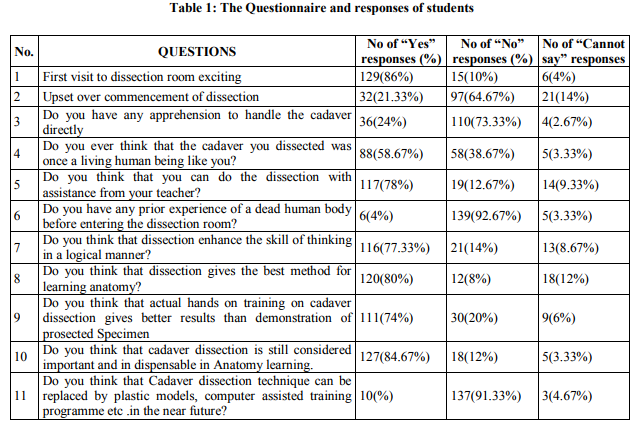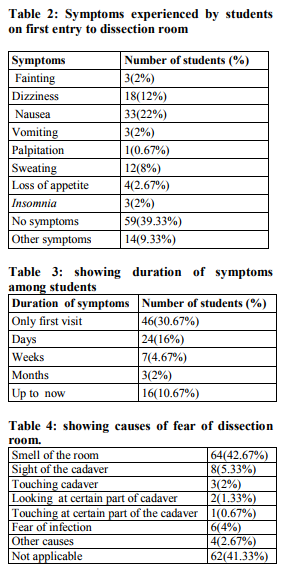IJCRR - 4(22), November, 2012
Pages: 54-58
Date of Publication: 24-Nov-2012
Print Article
Download XML Download PDF
ATTITUDE OF MEDICAL STUDENTS TO CADAVER DISSECTION IN AHMEDABAD CITY
Author: Bhaskar Patel, Jagdeep Jadav, Ajay Parmar, Bharat Trivedi
Category: Healthcare
Abstract:The objective of the present study was to determine the attitude of 1st Year medical students to dissection where they are being taught anatomy as a part of medical curricula. A questionnaire was administered to a class of 150 students of 1st year medical students at Smt. NHL Municipal Medical College, Ahmedabad, Gujarat, India in 2012. For each question, the students were directed to opt for one of the three possible responses: \"yes\", \"no\" or \"undecided\". Out of 150 students participated in the study 70 were female and 80 were male. In present study 84.67% of the students considered cadaver dissection is still considered important and indispensable in anatomy learning. Majority student (91.33%) agreed that actual hands on training on cadaver dissection gives better results than demonstration of prosected specimen. 80% of the students were view of that dissection gives the best method for learning. 86% of the student found their first visit to dissection room exciting.77.33% of the students agreed that dissection enhanced their skill of thinking in a logical manner. The present study indicates that cadaver dissection is still considered important and absolutely necessary in the study of human anatomy.
Keywords: attitudes, medical students, cadaver dissection, anatomy learning.
Full Text:
INTRODUCTION
Anatomy education is not only an essential part of the medical curriculum, but also helps to further the development of medical professionalism1.Anatomy is an integral part of the medical curriculum; a sound understanding of human anatomy helps the medical undergraduate for his future training in the clinical disciplines. Cadaveric dissection has been a regular feature in anatomy teaching since the Renaissance. The benefits of meticulous dissection mostly fall into three domains: knowledge acquisition and integration, skills, and attitudes.2 Dissection has been labelled as the “royal road” 3 and the cadaver as the “first patient4 . The initial exposure to a dead body causes emotional shock to the students 5,6 though gradually they adopt a professional attitude and accept dissection as an aid to study the body structure7 , Variety of emotional reactions and mixed feelings experienced by first year medical students when they encounter human cadavers for the first time in the dissection room 8 Some studies have indicated that students learn anatomy as well by studying prosections as they do by traditional dissecting 9,10,11,12. The use of cadavers for dissection has been identified by some as expensive, time consuming and potentially hazardous.13 It is for these reasons that dissection as a learning modality has been marginalised from medical curricula to the despair of some academics.14, 15, 16 .The objective of the present study was to determine the attitude of first year medical students to dissection where they are being taught anatomy as a part of medical curricula.
MATERIAL AND METHOD
This is a quantitative, study where a questionnaire was administered to a class of 150 students of first year medical students at Smt.NHL Municipal Medical College, Ahmedabad, Gujarat, India in 2012.Each student was explained the objective of the study and a questionnaire which consisted about visit to dissection room, mental and physical symptoms, causes of fear , previous encounters with death, reactions to dissecting room activity, respect for the cadaver; prior experience with a dead body before dissection , the possible alternatives for replacing cadaver dissection by plastic models, computer assisted training programme and its importance and indispensability. There was complete anonymity as no names or numbers were mentioned. The data collected was then analyzed results discussed in the light of available literatures.
RESULT
Total 150 students participated in the study out of this 70 were female and 80 were male with means age 19 years.


DISCUSSION
In present study majority of students considered cadaver dissection is still considered important and in dispensable in Anatomy learning. Cadaver dissection has been considered as an essential requirement in learning gross anatomy particularly the three-dimensional aspect of human anatomy17 and has remained the universally recognizable step in becoming a doctor 18which puts undergraduates at the sharp end of medical education 19. 80% of the students agreed that dissection gives the best method for learning anatomy. Handling of the human structures and organs creates a photographic memory while dissecting.20 . Majority student (91.33%) agreed that actual hands on training on cadaver dissection gave better results than demonstration of prosected specimen. This finding is consistent with the findings from previous studies conducted by Jones21,Johnson22 , Rajkumari and Singh 23,Rajkumari 8 Parker 24 and Mclachian .18 . Prakash25 et al describes dissection as “a precious experience” not to be missed as cadaveric dissection has other learning outcomes besides anatomical learning, such as fostering teamwork and respect for the human body. The studentcadaver-patient encounter is paramount in medical education. 80% of the students were view of that dissection gives the best method for learning anatomy. This finding is consistent with previous study by Rajkumari 8 and. Izunya A.M..26 86% of the student found their first visit to dissection room excited which is favoured by the study of Mc Garvey et al 27& Rajkumari.8 77.33% of the students agreed that dissection enhanced their skill of thinking in a logical manner. This finding is consistent with other studies.28,29,8 .The present study indicates that most of the students were not upset thereby supporting an earlier finding by Rajkumari8 et al. but contradicts the finding by Nnodim12 whose study reported that over threequarters of the students were upset at the beginning of dissection.
CONCLUSION
Cadaveric dissection is related with varied reactions. The students should have preparatory session which addresses various issues related to cadaveric dissection. Emotional issues during human dissection should not be neglected, but addressed repeatedly 30 .The students should be advised to prepare mentally and emotionally before entering the dissection room so that they are emotionally involved and stimulated31 .
ACKNOWLEDGEMENT
Authors acknowledge the immense help received from the scholars whose articles are cited and included in references of this manuscript. The authors are also grateful to authors/editors/publishes of all those articles, journals and books from where the literature for this article has been reviewed and discussed.
References:
1. Rizzolo LJ, Stewart WB. Should we continue teaching anatomy by dissection when…? Anat Rec B New Anat 2006; 289:215-8.
2. McLachlan JC, Patten D. Anatomy teaching: ghosts of the past, present and future. Med Educ 2006; 40:243-53. .
3. Newell RLM. Follow the royal road: the case for dissection. Clin Anat 1995; 8:124-7. Comment in: Clin Anat 1995; 8:128-33.
4. Coulehan JL, Williams PC, Landis DD, Naser C. The first patient, reflections and stories about the anatomy cadaver. Teach LearnMed 1995; 7:61-6
5. Evans, E.J. and G.H. Fitzgibbon,. The dissecting room: Reactions of first year medical students. Clin.Anat., 1992 ;5: 311- 320.
6. Finkelstein, P. and L. Matters,. Post traumatic stress among medical students in the anatomy dissectionlaboratory. Clin. Anat., 1990 ;3: 219-226.
7. Yeager, V.L.,. Peer teaching in gross anatomy. J.Med. Educ., 1981 ;56: 922.
8. Rajkumari, A.B., K. Das, G.T.N. Sangma andY.I. Singh,. Attitudes and views of first year medical students towards cadaver dissection inanatomy learning. Calicut Med. J., 2008;6(4): e2.
9. Jones, L.S., M.G. Welsh and L. Terracio,. First yearmedical students? views on computer programs: Give us our teaching assistants. FASEB J., 1998; 12: 5635
10. Bernard, G.R.,. Prosection demonstrations as substitutes for the conventional human gross anatomy laboratory. J. M ed. Educ., 1972; 47: 724-728.
11. Peppler, R.D., T.E. Kwasigroch and D.W. Hougland,. Evaluation of simultaneous teaching of extremities in a gross anatomy program. Acad. Med., 1985 ;60(8): 635-639.
12. Nnodim, J.O., E.C. Ohnaka and C.U. Osuji,. Afollowup comparative study of two modes of learning human anatomy: By dissection and from prosections.Clin. A nat., 1996; 9: 258-262
13. Azis, M.A., J.C. Mckenzie, J.S. Wilson, R.J. Cowie,S.A. Ayeni and B.K. Dunn,. The human cadaver in the age of biomedical informatics. Anat.Rec., 2002; 269(1): 20-32.
14. Dinsmore, C.E., S. Daugherty and H.J. Zeitz, 2001.Teaching and learning gross anatomy: Dissection,prosection, or „both of the above? Clin. Anat., 12:110-114. Educ., 60: 635-639.
15. Jones, D.G.,. Reassessing the importance of dissection: A critique and elaboration. Clin. A nat., 1997;10: 123-127.
16. Cahill, D.R. and R.J. Leonard,. The role of computers and dissection in teaching anatomy: A comment (Editorial). Clin. Anat., 1997; 10: 140-141.
17. Older, J.,. Anatomy: A must for teaching the next generation. Surg. J. R. Coll. Surg. Edinb. Irel., 2004:79-90.
18. Mclachian, J., P. Bradley, J. Searle and J. Bligh,. Teaching anatomy without cadavers. Med. Edu., 2004;38:418-424.
19. Maguire, P., Barriers to psychological care of the dying. Br. M ed. J., 1985; 291: 1711- 1713.
20. Rath G, Garg K. Inception of cadaver dissection and its relevance in present day scenario of medical education. J Indian Med Assoc2006; 104:331-3.
21. Jones, L.S., L.E. Paulman, R. Thadani and L. Terracio,. Medical student dissection of cadavers improves performance on practical exams but not on nbme anatomy subject exam. Med. Educ. Online, 2001;6(2).
22. Johnson, J.H.,. Importance of dissection in learning anatomy: Personal versus peer teaching. Clin. A nat., 2002;15: 38-44.
23. Rajkumari, A.B. and Y.I. Singh,. Body donation and its relevance in anatomy learning - A review. J.Anat. Soc. India, 2007; 56(1): 1-6.
24. Parker, L.M.,.What?s wrong with the dead body? Use of the human cadaver in medical education. Med. J. A ust., 2002; 176(2): 74- 76.
25. Prakash, P.L.V ,R. Rai, S. D?Costa, P.J. Jiji and G. Singh,. Cadaver as teachers in medical education: knowledge is the ultimate gift of body donors. Singap. Med. J., 2007; 48(3): 186-190.
26. A.M. Izunya,G.A. Oaikhena and A.O. Nwaopara; Attitudes to Cadaver Dissection in a Nigerian Medical School; Asian Journal of Medical Sciences 2010;2(3): 89-94
27. McGarvey, M.A., T. Farrell, R.M. Conroy, S. Kandiah and W.S. Monkhouse,. Dissection: a positive experience. Clin. Anat., 2001; 14(3): 227-230.
28. Weeks SE, Harris EE, Kinzey WG.Human gross anatomy: a crucial time to encourage respect and compassion in students. Clinical Anatomy 1995; 8(1):69-79.
29. Mutyala S, Cahill DR. Catching up.Clinical Anatomy 1996; 9: 53-56.
30. Tschernig T, Schlaud M, Pabst R. Emotional reactions of medical students to dissecting room bodies: A conceptual approach and its evaluation. Anatomical Record Part B: New Anatomist 2000; 261: 11-13.
31. Javadnia F, Hashemitabar M, Kalantarmahdavi SR, Khajehmougahi N. How to decrease the emotional impact of cadaver dissection in medical students. Pakistan Journal of Medical Sciences April - June 2006; 22 (2): 200 – 203
|






 This work is licensed under a Creative Commons Attribution-NonCommercial 4.0 International License
This work is licensed under a Creative Commons Attribution-NonCommercial 4.0 International License